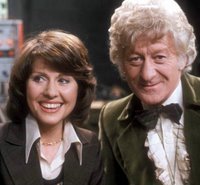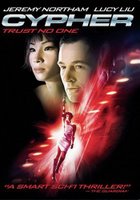I don’t often get misty watching TV. But Friday’s episode of Doctor Who on the SciFi Channel really got to me. Really.
First, though, I gotta finally acknowledge this second season of the new, reinvigorated Who, now four shows along. It rocks, and I feared it wouldn’t. Honestly, I was such a big fan of Christopher Eccleston in season one that I initially dreaded the second season debut of David Tennant as the latest Doctor regeneration — number 10, or is it 11? But I must say that Tennant is so good that he’s almost — and I stress almost — made me forget about Eccleston. Tennant’s enthusiasm for the role is exhilarating. And in this past week’s show, “School Reunion,” he really displayed his acting chops. He’s dynamite. Here’s why (and here’s where I reveal why this episode choked me up)...

“School Reunion” was a landmark Doctor Who episode. It featured the return of Sarah Jane Smith, my all-time favorite of the Doctor’s female companions. Sarah Jane, played by Elisabeth Sladen, traveled with the Doctor for slightly more than three seasons during the Jon Pertwee and Tom Baker years in the mid-1970s. And who among us didn’t fall in love with her? She was spunky. She was adorable. She was real. And when she left, I felt the same sadness I did when Emma said bye-bye to Steed in 1968. Well, last Friday night, after some three decades, Elisabeth Sladen was back playing Sarah Jane as fabulously as she did in the old days, this time to David Tennant’s Doctor. And Tennant, only four episodes into the role, created magic. Honest-to-God magic. Despite the fact that he’s 35 and Sladen is now 58, they both made you believe they had a history going back 30 years. When Sarah Jane stumbled upon the TARDIS, then realized that the young schoolteacher she’d met earlier was really the Doctor, I lost my breath along with her.
“Hello, Sarah Jane,” the Doctor says with a wide, sincere grin. He’s delighted to see her.
“Doctor. Oh my God, it’s you, isn’t it? You’ve regenerated.”
“Half a dozen times since we last met.”
“You look...incredible.”
“So do you,” the Doctor says wistfully.
Sarah Jane shakes her head. “I got old.”
This is J.M. Barrie for the 21st century, friends. Later:

“Did I do something wrong?” Sarah Jane asks the Doctor. “Because you never came back for me. You just...dumped me.”
“I told you I was called back home. And in those days, humans weren’t allowed.”
“I waited for you. I missed you.”
“Aw,” the Doctor replies boyishly, “you didn’t need me. You were getting on with your life.”
“You were my life. You could have come back.”
“I...couldn’t.”
“Why not?”
But we don’t hear the Doctor’s answer then. Rather, he gives the answer to his latest companion, Rose, played winningly by Billie Piper. Rose says to the Doctor, after having met and spoken to Sarah Jane:
“I’ve seen my future. You just leave us behind. Is that what you’re going to do to me?”
“No. Not to you.”
“But Sarah Jane...you were that close to her once, and now you never even mention her. Why not?”
“I don’t age,” the Doctor tells Rose. “I regenerate. But humans decay. You wither and you die. Imagine watching that happen to someone you —“
“What, Doctor?”
“You can spend the rest of your life with me. But I can’t spend the rest of mine with you. I have to live on. Alone. That’s the curse of the Time Lords.”

Goddamn magic. The people behind this series have brilliantly launched an all-new Doctor Who for a new generation, but it’s still marvelously tied to the past.
Incidentally, a new series starring Lis Sladen is spinning off from this one, and I understand K9 the robot dog will also appear. The Sarah Jane Adventures is now in production in England.




























